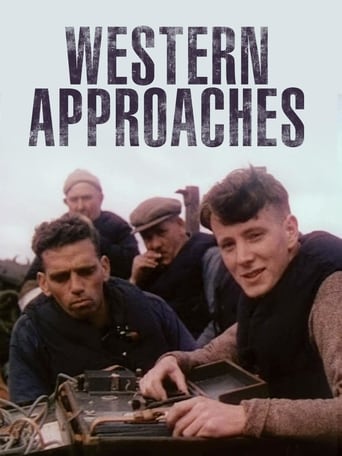Robert J. Maxwell
It's the middle of the war and there is a gap in mid-Atlantic between North America and England, desperate for supplies. A freighter is torpedoed and half a dozen crew find themselves adrift in a lifeboat with a makeshift sail, heading for the Irish coast which is far, far away. So far that it's doubtful they'll make it.The radio operator (or, pardon me, the wireless operator) has brought along a small, battery-operated transmitter, which he uses to send distress signals in hopes that a friendly vessel will pick them up. One does, another cargo ship, and she heads towards the lifeboat's position. The problem is that a U-boat has also received the calls. The KaEl assumes, correctly, that a British ship is coming to their rescue, so the U-boat bides its time, waiting for juicier fruit.The cargo ship finally comes, just as Sparks has exhausted the batteries of his transmitter, but despite the warnings of the men in the boat, the U-boat manages to put a torpedo into the rescue ship. The submarine is tricked into surfacing and there is a shoot out at sea.It was all filmed at sea and I can understand the pride shown by the director on the audio commentary. Yet, on the whole, it was disappointing. The actors were drawn from the ranks of seamen. They have the proper face but they can't act, and it shows. Two kinds of film were used in the shooting and one, three-strip technicolor, is clearly superior to the other.The Brits made some splendid movies during and after the war but in this instance one misses the faces that were to become so familiar. Where is Denholm Elliot? Shouldn't Dirk Bogarde be in here somewhere? And I longed for Bernard Lee. True, the score was conducted by Muir Matheson but Malcolm Arnold is nowhere in sight.It's a good, taut story but it lacks professionalism.
Tim Cawkwell
'Rome Open City', premiered in September 1945, was made with non- professionals; it depicted the war with dramatic intensity; it was filmed in the street as well as the studio. But if you change 'in the street' to 'on the open sea' I could as well be referring to 'Western Approaches' premiered almost a year earlier in December 1944. Rossellini of course went on to even greater things, whereas Pat Jackson, the maker of 'Western Approaches', went on to Hollywood and oblivion of a kind. Pity, because his wartime film is outstanding.For two reasons. It seems to be a drama but is it a documentary about the Atlantic convoys and the perils they faced? or is it a drama made realistic by documentary techniques? That ambivalence makes the film much more compelling, and Jackson can especially take the credit for the melodramatic but still credible idea at the centre of the film which lends it the suspense proper to a fiction film, that of the triangular situation between lifeboat, u-boat and destroyer. The second reason is the use of non-professionals, schooled in part by Jackson to use eye and voice, but also semi-improvising on the script, following it but also saying things in their own words (including a lot of natural naval swearing which the censors jumped upon unfortunately). They bring no baggage of other roles and lend an authenticity at all levels from captain to other officers to the merchant seamen in the lifeboat. It makes the film mesmerizing. Not to be sure Robert Bresson's 'involuntary expressive' but certainly naturally rather than artificially expressive which should be cinema's truest technique.www.timcawkwell.co.uk
carol-andrew
Very worthwhile reading Pat Jackson's memoir of his beginnings in film, in "Retake Please - Night Mail to Western Approaches" Conversational style easy to follow, and fascinating to learn how he and his crew achieved what they did, sometime through great hardship. He gives a lot of detail as to how effects were achieved, or not as the case may be. Reading his accounts brings home how ground breaking he was in creating his "documentary" style. Much criticism has been levelled at other war documentarians (EG Frank Hurley, II World war, Antarctic, photographer) for falsifying photos in order to achieve the romance of or horror of what they wanted to convey. It is clear in this memoir that Pat Jackson saw himself as having a "rallying the troops" job to do and he had no qualms using the illusions capable in the film technology of the time to get his message across. The most satisfying aspect of this memoir is his warmth and fondness for the people he met along the way, he often quotes from their first meetings in great detail, particularly the non professional casts he employed in Western Approaches. A wonderful read.
Enoch Sneed
The British film industry created a genre in the documentary-type war movie (San Demetrio London, The Cruel Sea, The Colditz Story, etc., etc.) and many of these are now regarded as classics. I am very surprised to see there are no comments on IMDb for 'Western Approaches' because it's a great little film and unique in several ways.Firstly, it was shot in colour by Jack Cardiff, one of the best cinematographers around (think of the use of colour in 'Black Narcissus' and 'The Red Shoes'). The small red sail of the lifeboat set against the unending grey of the sea makes for some wonderful images.Second, the cast were genuine merchant seaman who had fought in the Battle of the Atlantic. Their performances may not be up to professional standards perhaps, but they are heartfelt - thanks to their understanding of the situation torpedoed seamen faced in the war.The plot builds a good deal of suspense into the dilemma of the sailors who want to be rescued, of course, but know they are being used as a decoy for another U-Boat kill.If you get the chance to see this, don't miss it, it's a fine piece of film-making.


 AD
AD
